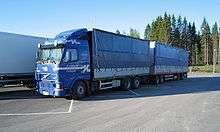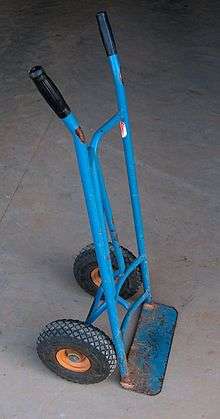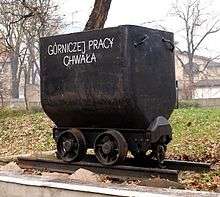Definify.com
Webster 1913 Edition
Truck
Truck
,Truck
,Truck
,Truck
,Truck
,Webster 1828 Edition
Truck
TRUCK
,TRUCK
,TRUCK
,Definition 2026
truck
truck
English



Noun
truck (countable and uncountable, plural trucks)
- A small wheel or roller, specifically the wheel of a gun-carriage.
- 1843, James Fenimore Cooper, Wyandotte, Chapter 3
- "Put that cannon up once, and I'll answer for it that no Injin faces it. 'Twill be as good as a dozen sentinels," answered Joel. "As for mountin', I thought of that before I said a syllable about the crittur. There's the new truck-wheels in the court, all ready to hold it, and the carpenters can put the hinder part to the whull, in an hour or two."
- 1843, James Fenimore Cooper, Wyandotte, Chapter 3
- The ball on top of a flagpole.
- (nautical) On a wooden mast, a circular disc (or sometimes a rectangle) of wood near or at the top of the mast, usually with holes or sheaves to reeve signal halyards; also a temporary or emergency place for a lookout. "Main" refers to the mainmast, whereas a truck on another mast may be called (on the mizzenmast, for example) "mizzen-truck".
- 1851 Melville, Herman Moby Dick, Chapter 9.
- But oh! shipmates! on the starboard hand of every woe, there is a sure delight; and higher the top of that delight, than the bottom of the woe is deep. Is not the main-truck higher than the kelson is low?
- 1851 Melville, Herman Moby Dick, Chapter 9.
- (countable, uncountable, US, Australia) A semi-tractor ("semi") trailer; (Britain) a lorry.
- Mexican open-bed trucks haul most of the fresh produce that comes into the United States from Mexico.
- 1922, Sinclair Lewis, Babbit, Chapter 1
- A line of fifty trucks from the Zenith Steel and Machinery Company was attacked by strikers-rushing out from the sidewalk, pulling drivers from the seats, smashing carburetors and commutators, while telephone girls cheered from the walk, and small boys heaved bricks.
- Any motor vehicle designed for carrying cargo, including delivery vans, pickups, and other motorized vehicles (including passenger autos) fitted with a bed designed to carry goods.
- A garden cart, a two-wheeled wheelbarrow.
- A small wagon or cart, of various designs, pushed or pulled by hand or (obsolete) pulled by an animal, as with those in hotels for moving luggage, or in libraries for transporting books.
- Macaulay
- Goods were conveyed about the town almost exclusively in trucks drawn by dogs.
- 1906, Upton Sinclair, The Jungle, Chapter 3
- From the doors of these rooms went men with loaded trucks, to the platform where freight cars were waiting to be filled; and one went out there and realized with a start that he had come at last to the ground floor of this enormous building.
- Macaulay
- A pantechnicon (removal van).
- (Britain, rail transport) A flatbed railway car.
- 1913, D.H. Lawrence, Sons and Lovers, chapter 15
- Far away he could hear the sharp clinking of the trucks on the railway.
- 1938, Xavier Herbert, Capricornia, Chapter VI, p. 77,
- Then she went off with Nawnim, past the three coaches provided for superior passengers, to the trucks at the front, where the crowd was entirely black.
- 1913, D.H. Lawrence, Sons and Lovers, chapter 15
- A pivoting frame, one attached to the bottom of the bed of a railway car at each end, that rests on the axle and which swivels to allow the axle (at each end of which is a solid wheel) to turn with curves in the track. The axle on many types of railway car is not attached to the truck and relies on gravity to remain within the truck's brackets (on the truck's base) that hold the axle in place
- 1913, D.H. Lawrence, Sons and Lovers
- Far away he could hear the sharp clinking of the trucks on the railway. No, it was not they that were far away. They were there in their places. But where was he himself?.
- 1913, D.H. Lawrence, Sons and Lovers
- The part of a skateboard or roller skate that joins the wheels to the deck, consisting of a hanger, baseplate, kingpin, and bushings, and sometimes mounted with a riser in between.
- (theater) A platform with wheels or casters.
- Dirt or other messiness.
- Aunt Polly looked at the jam on Huck's face, and said, "What is that truck?" - Mark Twain, Huckleberry Finn
Synonyms
Derived terms
|
|
See also
- (nautical, sailing) main-truck, crow's nest
- (military) gun-carriage
- (semi-tractor): semi, trailer truck, rig, monster truck
Translations
|
|
|
|
|
|
|
|
|
Descendants
- Malay: trak
Verb
truck (third-person singular simple present trucks, present participle trucking, simple past and past participle trucked)
- (intransitive) To drive a truck.
- (transitive) To convey by truck.
- Last week, Cletus trucked 100 pounds of lumber up to Dubuque.
- (intransitive, US, slang, 1960s) To travel or live contentedly.
- Keep on trucking!
- (intransitive, US, slang, 1960s) To persist, to endure.
- Keep on trucking!
- (intransitive, film production) To move a camera parallel to the movement of the subject.
- (transitive, slang) To fight or otherwise physically engage with.
- 1993, Sue Grafton, "J" Is for Judgment
- Both deputies were big, made of dense flesh and tough experience. . . . I wouldn't have wanted to truck with either one of them.
- 1993, Sue Grafton, "J" Is for Judgment
- (transitive, slang) To run over or through a tackler in American football.
Derived terms
Translations
Etymology 2
From Middle English truken, troken, trukien, from Old English trucian (“to fail, run short, deceive, disappoint”), from Proto-Germanic *trukōną (“to fail, miss, lack”), from Proto-Indo-European *dereu-, *derwu- (“to tear, wrap, reap”), from Proto-Indo-European *der- (“to flay, split”). Cognate with Middle Low German troggelen (“to cheat, deceive, swindle”), Dutch troggelen (“to extort”), German dialectal truggeln (“to flatter, fawn”).
Alternative forms
- trock
Verb
truck (third-person singular simple present trucks, present participle trucking, simple past and past participle trucked)
- (intransitive, now chiefly dialectal) To fail; run out; run short; be unavailable; diminish; abate.
- (intransitive, now chiefly dialectal) To give in; give way; knuckle under; truckle.
- (intransitive, now chiefly dialectal) To deceive; cheat; defraud.
Derived terms
Related terms
Etymology 3
From dialectal truck, truk, trokk, probably of North Germanic origin, compare Norwegian dialectal trokka, trakka (“to stamp, trample, go to and fro”), Danish trykke (“to press, press down, crush, squeeze”), Swedish trycka. More at thrutch.
Verb
truck (third-person singular simple present trucks, present participle trucking, simple past and past participle trucked)
Etymology 4
Middle English trukien, from unrecorded Anglo-Norman and Old French words (attested in mediaeval Latin trocare, present Spanish trocar), of Unknown origin.
Verb
truck (third-person singular simple present trucks, present participle trucking, simple past and past participle trucked)
- (transitive) To trade, exchange; barter.
- John Stuart Mill
- We will begin by supposing the international trade to be in form, what it always is in reality, an actual trucking of one commodity against another.
- John Stuart Mill
- (intransitive) To engage in commerce; to barter or deal.
- 1624, John Smith, Generall Historie, Kupperman 1988 edition:
- But while this businesse was in hand, Arrived one Captaine Argall, and Master Thomas Sedan, sent by Master Cornelius to truck with the Collony [...]
-
- (intransitive) To have dealings or social relationships with; to engage with.
Translations
Noun
truck (plural trucks)
- (obsolete, often used in plural sense) Small, humble items; things, often for sale or barter.
- 1911, Edna Ferber, chapter 5, in Dawn O'Hara, the Girl who Laughed:
- It happened in this way, on a day when I was indulging in a particularly greenery-yallery fit of gloom. Norah rushed into my room. I think I was mooning over some old papers, or letters, or ribbons, or some such truck in the charming, knife-turning way that women have when they are blue.
- (historical) The practice of paying workers in kind, or with tokens only exchangeable at a shop owned by the employer [forbidden in the 19th century by the Truck Acts]
- (US) Garden produce, groceries (see truck garden).
- (usually with negative) Social intercourse; dealings, relationships.
Derived terms
Adjective
truck (not comparable)
- Pertaining to a garden patch or truck garden.
- 1792 November 4, George Washington, (Please provide the title of the work), quoted in The writings of George Washington from the original manuscript sources: Volume 32, 1745-1799.:
- As the home house people (the industrious part of them at least) might want ground for their truck patches, they might, for this purpose, cultivate what would be cleared. But I would have the ground from the cross fence by the Spring, quite round by the Wharf, first grubbed, before the (above mentioned) is attempted.
-
Usage notes
For this etymology, the word is virtually obsolete. It really only survives as a fossil in the construction “to have no truck with”. In the US, the derived term truck garden is often confused with "produce raised to be trucked (transported) to market".